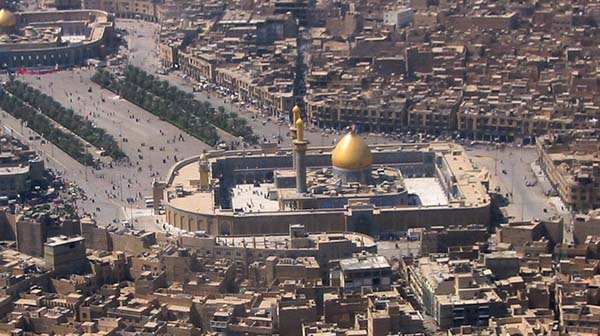Imam Husain (A.S) left Medina for Mecca. In Medina, he received the invitation of the people of Kufa, “We believe in you and expect you to accept the leadership. We need your leadership. We will give power to you. We will stand with you against usurpation and oppression. We will defend you. Please release us from this exploitive government.”
In Medina, Imam Husain (A.S) announced: “Following in the traditions of my grandfather and my father, I am leaving Medina to ‘invite people to the good and to forbid evil.’” Then he traveled the 600 kilometers and arrived in Mecca, accompanied by his family.
In Mecca, he announced to the pilgrims who had come for the annual pilgrimage, “I am going to my death.” He added, “Death, for the sons of Adam, is as beautiful as a necklace around the neck of a young and beautiful girl. Death is an ornament for mankind.” Then he left Mecca to go towards death.
The situation was very critical. Thoughts were paralyzed, personalities sold out and the faithful were left alone. Young people were either in a state of hopelessness or sold themselves out. The important pioneers of Islam had either been martyred or silenced and choked or made to sell out. “It is a time when no sounds are heard from the community. Pens have been broken. Tongues have been cut off. Lips have been scaled shut. All of the pillars of truth have been knocked down, and have fallen on top of the faithful followers.”
Imam Husain (A.S), as a responsible leader, realized that if he remained silent, Islam would change into a religion of the government and into a military-economic power and nothing more. Islam would become as other regimes and powers. If their power diminished, their army and government were destroyed; nothing would remain other than a memory and an accident in history.
Imam Husain (A.S) was in great dilemma. He could neither remain silent nor fight. He couldn’t remain silent because time and opportunity were passing. Everything was being ruined, such as thoughts, goals, values, ideals, and everything brought by the message of Mohammad (PBUH), the Islam that he brought and developed through jihad, great efforts and struggles. He could not remain silent because he had a duty to fight against oppression.
On the other hand, fighting with empty hand against an armed regime was a great challenge. He was surrounded by the ruling, oppressive regime. He could neither shout out nor surrender or attack. He remained with empty hands, yet the heavy burden of responsibility placed upon his shoulder. He received nothing from the power and the results of the struggles and efforts of his grandfather, the holy Prophet (PBUH), his father, Ali (A.S) and his brother, Imam Hassan (A.S) except an honor, a misery and a very heavy responsibility. He was alone and unarmed. Opposing him was one of the most savage empires of the world.
He was lonely but responsible to the school of thought. In this school of thought, the lonely man is also responsible to oppose the determining power of fate because responsibility appears from awareness and faith rather than power and possibility. The more aware one is, the more responsible he will be held.
Almost no one else had remained in the ranks of truth, justice, awareness. All fronts had been released. All of the defenders had either been killed or ran away. He had remained alone and empty handed, but surrounded by the enemy who caused others to surrender to the silence, to become indifferent and fall into public ignorance.
What should he have done? “Being Husain (A.S)” called him to fight but he had no arms to fight with and yet he had the duty to fight. He left Medina for this purpose. He arrived in Mecca to announce his unique answer to all Muslims who had gathered there for the pilgrimage ceremonies.
The Companions, outstanding personalities, theologians and religious scholars, dependent upon the regime, forbid him saying, “Ali’s (A.S) type of thinking is not practical and contains too much hardship. It is too strict. One must consider realities. One must be a realist, not an idealist. Ali (A.S) ruled over the greater part of the known world, but he still mended his own shoes himself! He worked like a common laborer. Today people judge by what they see. This is particularly true since Iran and Rome had been defeated and Muslims had seen the glory and magnificence of the huge, fantastic palaces and the greatness and majesty of the King of Kings of Iran and the Caesars of Rome. No, this kind of living is not acceptable! It is not good for the reputation and prestige of an Islamic government.”
Therefore, in reply to “What should be done?” they answer, “The idealistic revolutionary standards of Islam at the time of the Prophet (PBUH) should be reviewed. Times have changed and Islam today no longer revolves around Mecca and Medina. It stretches from the Byzantium to Iran. It should therefore, not be influenced by those idealistic desires of Ali (A.S) and his strict and difficult ways which reach towards complete justice.”
They recommended him remain silent and attend to the religious training of people, teaching the Quran, promoting religious jurisprudence and repeating the Prophet’s (PBUH) Sunnah.
However, there is only one man - a lonely man - who says “Yes.” What is that yes? It was a response behind which was total inability, total weakness in a time of darkness and silence, against oppression and tyranny, an aware and faithful man who still had the responsibility of the jihad. It is Imam Husain’s (A.S) command: “Yes!” There is also a “must” in his inability. For him, living lied in idea and jihad.

